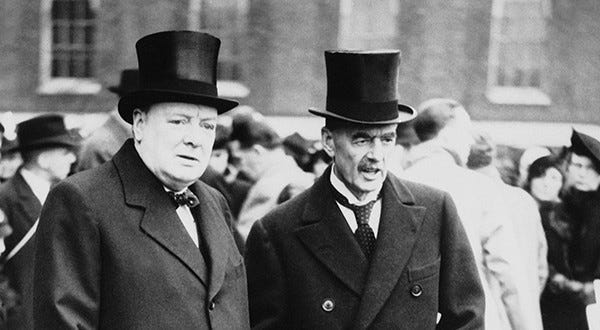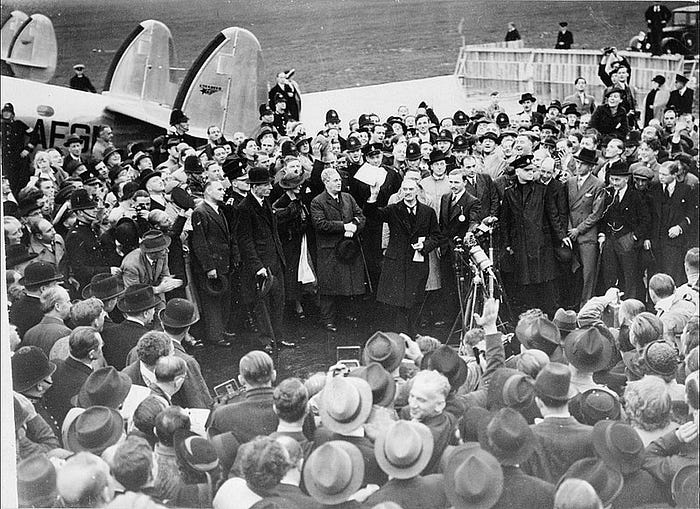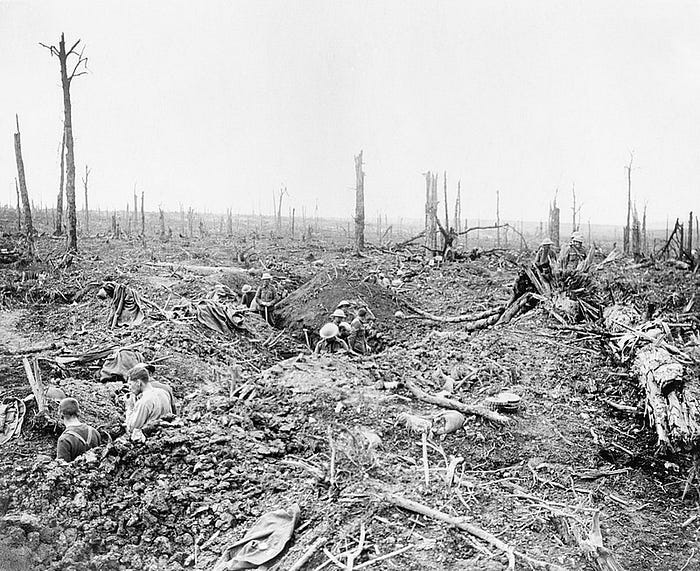Winston Churchill’s Masterful Speech After Neville Chamberlain’s Death
A better way to look at history and another view to one of the biggest missteps of all time

Neville Chamberlain is that one person from history none of us want to be. Or at least it appears that way. His name in contemporary politics can be tossed about as an insult stressing weakness or shortsightedness. Furthermore, in history classes he’s generally pointed out as naïve — the highly educated dope that got conned by Adolf Hitler.
Pilita Clark in her article in the Financial Times eloquently describes the standard recollection of Chamberlain and his pre-World War II actions:
“As Adolf Hitler was tugging the world towards war in the late 1930s, Britain’s prime minister, Neville Chamberlain, decided to do something that few world leaders had done before: meet the man in person. Chamberlain famously went to Germany three times in September 1938…He looked him in the eye. He shook his hand and when the German leader said that the only bit of Europe he wanted to annex was the Sudetenland, Chamberlain…believed him. ‘I got the impression that here was a man who could be relied upon when he had given his word,’ Chamberlain later wrote to his sister.”
This summation itself might make some laugh, others wince. Either way, it’s not laudable.
While history proved Winston Churchill right in ringing the warning bell about Hitler, an odd twist of fate occurred during this timeline. Chamberlain died in 1940. Whereas standard politics requires one to use an opponent’s mistakes and figure as a whipping board, suddenly Chamberlain was gone.
There was an instant break between whatever political rivalry existed. Churchill examined Chamberlain and gave an incredibly gracious speech to the British House of Commons on an opponent, human nature, and an examination of history in its proper light.
Churchill’s words also invite us to revisit Chamberlain’s infamous decision and look it over at another angle. Not to excuse it. But to understand the actions and why Chamberlain made them.
Churchill starts with the elephant in the room. Why would anyone trust Hitler wanted peace?
Negotiations To Avoid A Hellish Repeat Of History
“It fell to Neville Chamberlain in one of the supreme crises of the world to be contradicted by events, to be disappointed in his hopes, and to be deceived and cheated by a wicked man. But what were these hopes in which he was disappointed…They were surely among the most noble and benevolent instincts of the human heart-the love of peace, the toil for peace, the strife for peace, the pursuit of peace, even at great peril, and certainly to the utter disdain of popularity or clamour.”
— Winston Churchill, Speech to House of Commons 11/12/1940
While many use Chamberlain as a punching bag, Churchill points out his aims were of a noble nature. It pushed him to be the last to call for war and similarly drove him to be the last to quit in pursuit of a positive goal.
Also, while Hitler claimed he only wanted peace as he invaded his neighbors, Britain actually did everything possible to ensure war was avoided. That attempt brought unity to the island. According to Churchill, the peace effort gave the British “clean hearts” as they entered the long painful years ahead.
Churchill also called Chamberlain a nontraditional politician. While politics can often bring out the worst in people, it was never that way despite the heat of the times. Churchill notes he spent time as both Chamberlain’s opponent and lieutenant. He also went from serving as his subordinate to his superior.
In each differing relationship, Chamberlain showed loyalty and was an honest broker. So, why wouldn’t a person of this nature expect the same from a negotiating partner? Especially with what was at stake.

According to Churchill, Chamberlain attempted “to save the world from the awful, devastating struggle in which we are now engaged.” Both would have uniquely understood the repercussions of a World War. Each had a front row seat to the first.
It’s this personal experience most of us forget as we pass judgement on Chamberlain from our modern world with its hindsight. But Churchill chides us to look at history a different way.
Views Of History Change Over Time
“It is not given to human beings, happily for them, for otherwise life would be intolerable, to foresee or to predict to any large extent the unfolding course of events. In one phase men seem to have been right, in another they seem to have been wrong. Then again, a few years later, when the perspective of time has lengthened, all stands in a different setting. There is a new proportion. There is another scale of values.”
— Winston Churchill, Speech to House of Commons 11/12/1940
Living through World War I, both Churchill and Chamberlain would have had a hellish view of war, knowing well the carnage it reeked on Europe. It’s not something we can fathom. So, knowing the outcome of Chamberlain’s actions and being divorced from the pains of the First World War, it’s easy to wag fingers.
In our present day, Vietnam is considered a modern day meatgrinder of humanity and an impetus for a peace movement. During the years of the conflict, the U.S. suffered about 58,000 casualties. Now, let’s go back to 1916.
According to the Encyclopedia Britannica, Britain suffered over 57,000 casualties on one day at the Battle of the Somme. Look at the number one more time and let that settle in. It was one day, not even the entire battle. The army had to regroup and fight again after this for years. So, Britain had multiple Vietnams over the course of one war.
Overall, thirty-five percent of Britain’s nine-million-man force were claimed as casualties. Stunningly, this was a good total.
For France, seventy-three percent of their entire force was listed as casualties. That works out to over six-million men. How would that affect your political view coming into another possible World War? Well, it might just drive you to insane lengths to avoid another conflict.
But we can only experience this world from a hundred years in the future. That number of dead and wounded doesn’t compute. But for both men, it was a reality. It was their elephant in the room.
This is something we should consider before we enforce our present-day values on both Churchill or Chamberlain. But the speech continued.
Another View Of That Person No One Wants To Be
Churchill went on to say Chamberlain offered to leave the government all together if it would help England with the war effort. He was kept on. Despite being terminally ill, he continued coming to work, even during bombardment.
Churchill marveled at how he worked through the pain. Also, when Chamberlain was finally too sick to leave his bed, he refused any recognition, preferring to die humbly without any kind of title. It’s a view we rarely get of this figure.
Earlier I mentioned Neville Chamberlain is that one person in history none of us want to be. In my opinion, it’s still true. But for an entirely different reason. What person would want to be tasked with his decision to enter another global conflict after viewing the carnage of the Somme?

Churchill revisits this moment in a much more articulate manner than I ever could:
“History with its flickering lamp stumbles along the trail of the past, trying to reconstruct its scenes, to revive its echoes, and kindle with pale gleams the passion of former days. What is the worth of all this? The only guide to a man is his conscience; the only shield to his memory is the rectitude and sincerity of his actions. It is very imprudent to walk through life without this shield, because we are so often mocked by the failure of our hopes and the upsetting of our calculations; but with this shield, however the fates may play, we march always in the ranks of honour.”
While Chamberlain in hindsight made a terrible decision — perhaps one of the worst ever made. He was an honorable man doing the best he could with the information at hand, particularly the memory of World War I. His rival felt the same way.
Churchill’s speech is also an excellent lesson on viewing history from a distorted future lens. We can usually see the particulars. But we tend to miss the overall picture when we don’t set our focus wide enough and clean the glass we look through.
I’ve listed the link previously, but I’d recommend you read his speech in its entirety. It’s a sobering examination of a pivotal time in history, also a masterclass on character, leadership, and self-examination.
-Originally posted on Medium May 20, 2022


